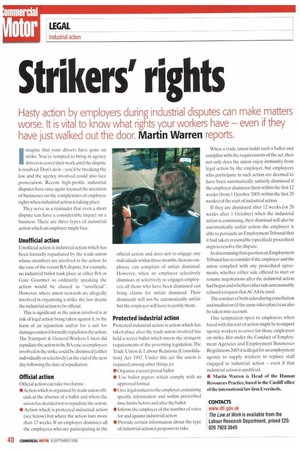Strikers' rights
Page 40

If you've noticed an error in this article please click here to report it so we can fix it.
Hasty action by employers during industrial disputes can make matters worse. It is vital to know what rights your workers have — even if they have just walked out the door. Martin Warren reports.
Imagine that your drivers have gone on strike. You're tempted to bring in agency drivers to cover their work until the dispute is resolved. Don't do it you'd be breaking the law and the agency involved could also face prosecution. Recent high-profile industrial disputes have once again focused the attention of businesses on the complexities of employee rights when industrial action is taking place.
They serve as a reminder that even a short dispute can have a considerable impact on a business. There are three types of industrial action which an employer might face.
Unofficial action
Unofficial action is industrial action which has been formally repudiated by the trade union whose members are involved in the action. in the case of the recent BA dispute, for example, no industrial ballot took place at either BA or Gate Gourmet so ordinarily speaking the action would be classed as -unofficial". However, where union stewards are allegedly involved in organising a strike the law deems the industrial action to be official.
This is significant as the union involved is at risk of legal action being taken against it, in the form of an injunction and/or for a suit for damages unless it formally repudiates the action. The Transport & General Workers Union did repudiate the action in the BA case,so employees involved in the strike could he dismissed (either individually or selectively) at the end of the next day following the date of repudiation.
Official action
Official action can take two forms: • Action which is organised by trade union officials in the absence of a ballot and where the union has decided not to repudiate the action; • Action which is protected industrial action (see below) but where the action lasts more than 12 weeks. If an employer dismisses all the employees who are participating in the official action and does not re-engage any individuals within three months, then no employee can complain of unfair dismissal. However, when an employer selectively dismisses or selectively re-engages employees, all those who have been dismissed can bring claims for unfair dismissal. Their dismissals will not be automatically unfair hut the employer will have to justify them.
Protected industrial action
Protected industrial action is action which has taken place after the trade union involved has held a secret ballot which meets the stringent requirements of the governing legislation,The Trade Union & Labour Relations 'Consolidation] Act 1992. Under this act the union is required, among other things, to: • Organise a secret postal ballot • Use ballot papers which comply with an approved format • Give legal notices to the employer, containing specific information and within prescribed time limits, before and after the ballot • Inform the employer of the number of votes for and against industrial action • Provide certain information about the type of industrial action it proposes to take. When a trade union holds such a ballot and complies with the requirements of the act, then not only does the union enjoy immunity from legal action by the employer, but employees who participate in such action are deemed to have been automatically unfairly dismissed if the employer dismisses them within the first 12 weeks (from 1 October 2005, within the first 20 weeks) of the start of industrial action.
If they are dismissed after 12 weeks (or 20 weeks after 1 October) when the industrial action is continuing, their dismissal will also be automatically unfair unless the employer is able to persuade an Employment Tribunal that it had taken reasonable (specified) procedural steps to resolve the dispute.
In determining that question an Employment Tribunal has to consider if the employer and the union complied with any procedural agreements, whether either side offered to start or resume negotiations after the industrial action had begun and whether either side unreasonably refused a request that ACAS be used.
The conduct of both sides during conciliation and mediation (if the same takes place) can also be taken into account.
One temptation open to employers when faced with this sort of action might be to import agency workers to cover for those employees on strike. But under the Conduct of Employment Agencies and Employment Businesses Regulations 2(X)3 it is illegal for an employment agency to supply workers to replace staff engaged in industrial action even if that industrial action is unofficial.
• Martin Warren is Head of the Human Resources Practice, based in the Cardiff office of the international law firm Eversheds.
CONTACTS www.dli.gov.uk The Law at Work is available from the Labour Research Department, priced £25: 020 7923 3649








































































































































































































